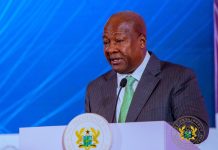Governor of the Bank of Ghana, Dr. Johnson Asiama, has rejected suggestions that the Central Bank is overstepping its bounds in managing the foreign exchange market, stressing that its actions fall squarely within a flexible exchange rate framework aimed only at curbing excessive volatility.
Speaking at the IMF–World Bank Governor Talk Series in Washington, D.C., Dr. Asiama explained that while the Bank occasionally intervenes to stabilise the cedi, such actions are reserved for periods of exceptional market pressure.
“The framework that we have is a flexible exchange rate management framework. Essentially, what we do is smoothen excessive volatilities,” he stated.
Addressing concerns about the scale of intervention, he said: “Yes, there were allegations about whether we were intervening in the market, but that was not exactly the case,” noting that significant foreign outflows had required short-term support from the Central Bank.
According to Dr. Asiama, between the second and third quarters of 2025, Ghana undertook several “lumpy” foreign payments, including billions of U.S. dollars to Independent Power Producers (IPPs) and domestic bondholders who exited their holdings amid the cedi’s appreciation.
At the same time, remittance inflows weakened, draining liquidity from the interbank foreign exchange market.
“In the mix of that, the central bank had to step in. The interbank FX market had dried up, so the central bank had to provide that support,” he said.
Dr. Asiama added that market conditions have since improved, thanks to directives requiring mining firms to channel all foreign exchange inflows through commercial banks — a measure that is already showing positive results.
“We do not over-support the market at all. What we seek to do is limit volatility to ensure smooth dynamics in the market, and that is the framework we will maintain going forward,” he affirmed.






















































![[FREE FREE MONEY] Predict and Win a Guaranteed GH¢200 From Us EVERY WEEK](https://wordpress.ghanatalksradio.com/wp-content/uploads/2022/02/Predict-and-Win-Final-09-03-2021-218x150.jpg)
![[Predict & Win – 8th/Oct.] WIN A Guaranteed ¢200 From Us This Week](https://wordpress.ghanatalksradio.com/wp-content/uploads/2021/10/maxresdefault-16-218x150.jpg)
![[Predict & Win – 2nd] WIN A Guaranteed ¢200 From Us This Week](https://wordpress.ghanatalksradio.com/wp-content/uploads/2021/09/maxresdefault-50-218x150.jpg)
![[Predict & Win – 25th] WIN A Guaranteed ¢200 From Us This Week](https://wordpress.ghanatalksradio.com/wp-content/uploads/2021/09/maxresdefault-36-218x150.jpg)
![[Predict & Win – 18th] WIN A Guaranteed ¢200 From Us This Week](https://wordpress.ghanatalksradio.com/wp-content/uploads/2021/09/maxresdefault-23-218x150.jpg)









![[National cathedral] See full list of churches that have contributed since 2018](https://wordpress.ghanatalksradio.com/wp-content/uploads/2020/09/Ghana-National-Cathedral-GhanaTalksRadio-100x70.jpg)



